Business Law: Company Structure, Director Duties, and Liabilities
VerifiedAdded on 2022/12/29
|8
|2150
|32
Report
AI Summary
This report delves into various business structures beyond sole proprietorship, including partnerships and companies, highlighting their advantages and disadvantages. It emphasizes the importance of limited liability offered by a company structure and the concept of perpetual succession. The report then focuses on the duties and responsibilities of company directors, referencing the Companies Act 2006 and specific sections outlining their obligations to act within their powers, promote company success, exercise independent judgment, and act with diligence and care. It also covers directors' duties related to conflicts of interest, benefits from third parties, and disclosure of personal interests. Furthermore, the report discusses director disqualification scenarios, including failure to maintain proper accounts, submit annual returns, or comply with tax regulations. The report also touches upon directors' responsibilities towards employees and the relevant employment legislation, such as the Employment Rights Act 1996. It provides a comprehensive overview of the legal framework governing company directors and their crucial roles in business operations, making it a valuable resource for students on Desklib.
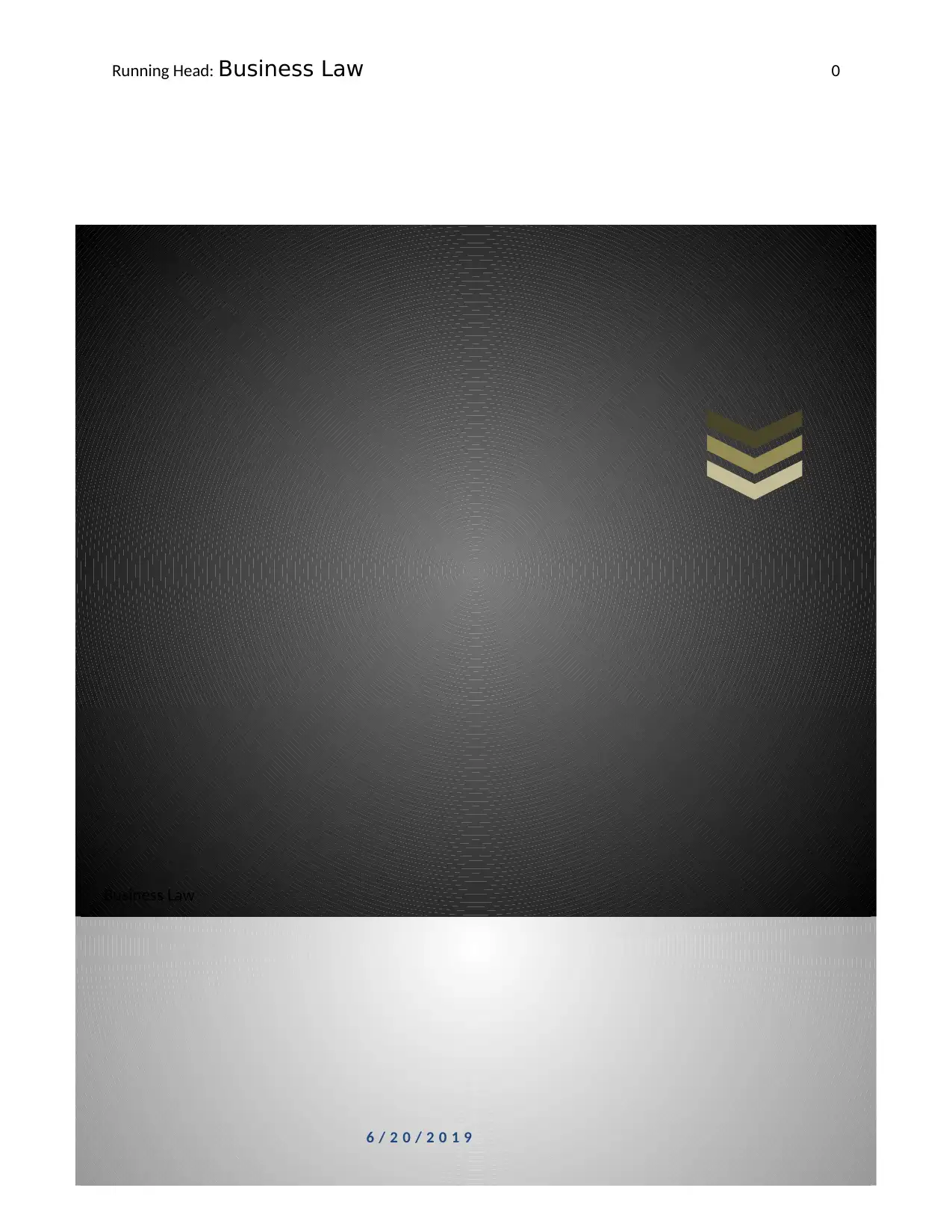
Business Law
Running Head: Business Law 0
6 / 2 0 / 2 0 1 9
Running Head: Business Law 0
6 / 2 0 / 2 0 1 9
Paraphrase This Document
Need a fresh take? Get an instant paraphrase of this document with our AI Paraphraser
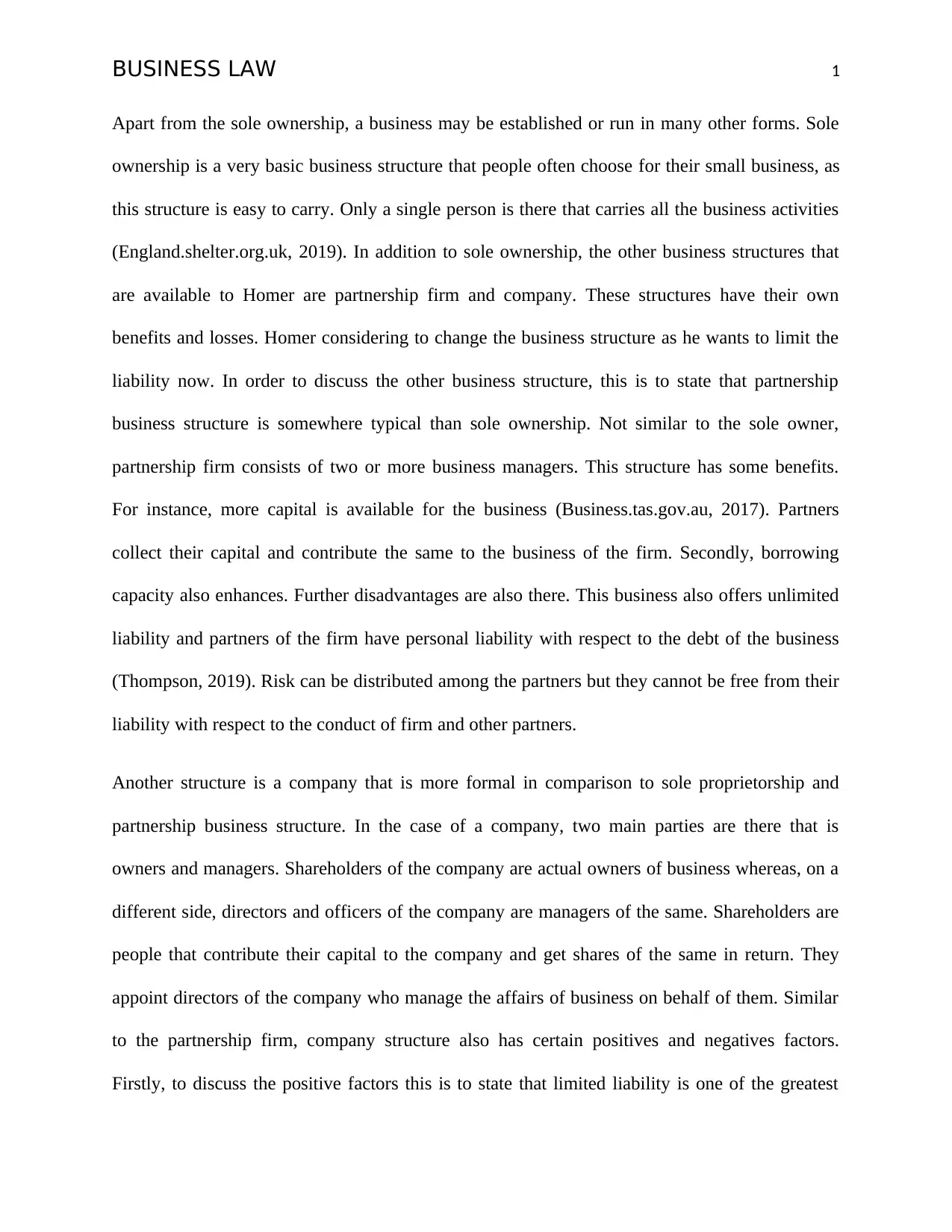
BUSINESS LAW 1
Apart from the sole ownership, a business may be established or run in many other forms. Sole
ownership is a very basic business structure that people often choose for their small business, as
this structure is easy to carry. Only a single person is there that carries all the business activities
(England.shelter.org.uk, 2019). In addition to sole ownership, the other business structures that
are available to Homer are partnership firm and company. These structures have their own
benefits and losses. Homer considering to change the business structure as he wants to limit the
liability now. In order to discuss the other business structure, this is to state that partnership
business structure is somewhere typical than sole ownership. Not similar to the sole owner,
partnership firm consists of two or more business managers. This structure has some benefits.
For instance, more capital is available for the business (Business.tas.gov.au, 2017). Partners
collect their capital and contribute the same to the business of the firm. Secondly, borrowing
capacity also enhances. Further disadvantages are also there. This business also offers unlimited
liability and partners of the firm have personal liability with respect to the debt of the business
(Thompson, 2019). Risk can be distributed among the partners but they cannot be free from their
liability with respect to the conduct of firm and other partners.
Another structure is a company that is more formal in comparison to sole proprietorship and
partnership business structure. In the case of a company, two main parties are there that is
owners and managers. Shareholders of the company are actual owners of business whereas, on a
different side, directors and officers of the company are managers of the same. Shareholders are
people that contribute their capital to the company and get shares of the same in return. They
appoint directors of the company who manage the affairs of business on behalf of them. Similar
to the partnership firm, company structure also has certain positives and negatives factors.
Firstly, to discuss the positive factors this is to state that limited liability is one of the greatest
Apart from the sole ownership, a business may be established or run in many other forms. Sole
ownership is a very basic business structure that people often choose for their small business, as
this structure is easy to carry. Only a single person is there that carries all the business activities
(England.shelter.org.uk, 2019). In addition to sole ownership, the other business structures that
are available to Homer are partnership firm and company. These structures have their own
benefits and losses. Homer considering to change the business structure as he wants to limit the
liability now. In order to discuss the other business structure, this is to state that partnership
business structure is somewhere typical than sole ownership. Not similar to the sole owner,
partnership firm consists of two or more business managers. This structure has some benefits.
For instance, more capital is available for the business (Business.tas.gov.au, 2017). Partners
collect their capital and contribute the same to the business of the firm. Secondly, borrowing
capacity also enhances. Further disadvantages are also there. This business also offers unlimited
liability and partners of the firm have personal liability with respect to the debt of the business
(Thompson, 2019). Risk can be distributed among the partners but they cannot be free from their
liability with respect to the conduct of firm and other partners.
Another structure is a company that is more formal in comparison to sole proprietorship and
partnership business structure. In the case of a company, two main parties are there that is
owners and managers. Shareholders of the company are actual owners of business whereas, on a
different side, directors and officers of the company are managers of the same. Shareholders are
people that contribute their capital to the company and get shares of the same in return. They
appoint directors of the company who manage the affairs of business on behalf of them. Similar
to the partnership firm, company structure also has certain positives and negatives factors.
Firstly, to discuss the positive factors this is to state that limited liability is one of the greatest
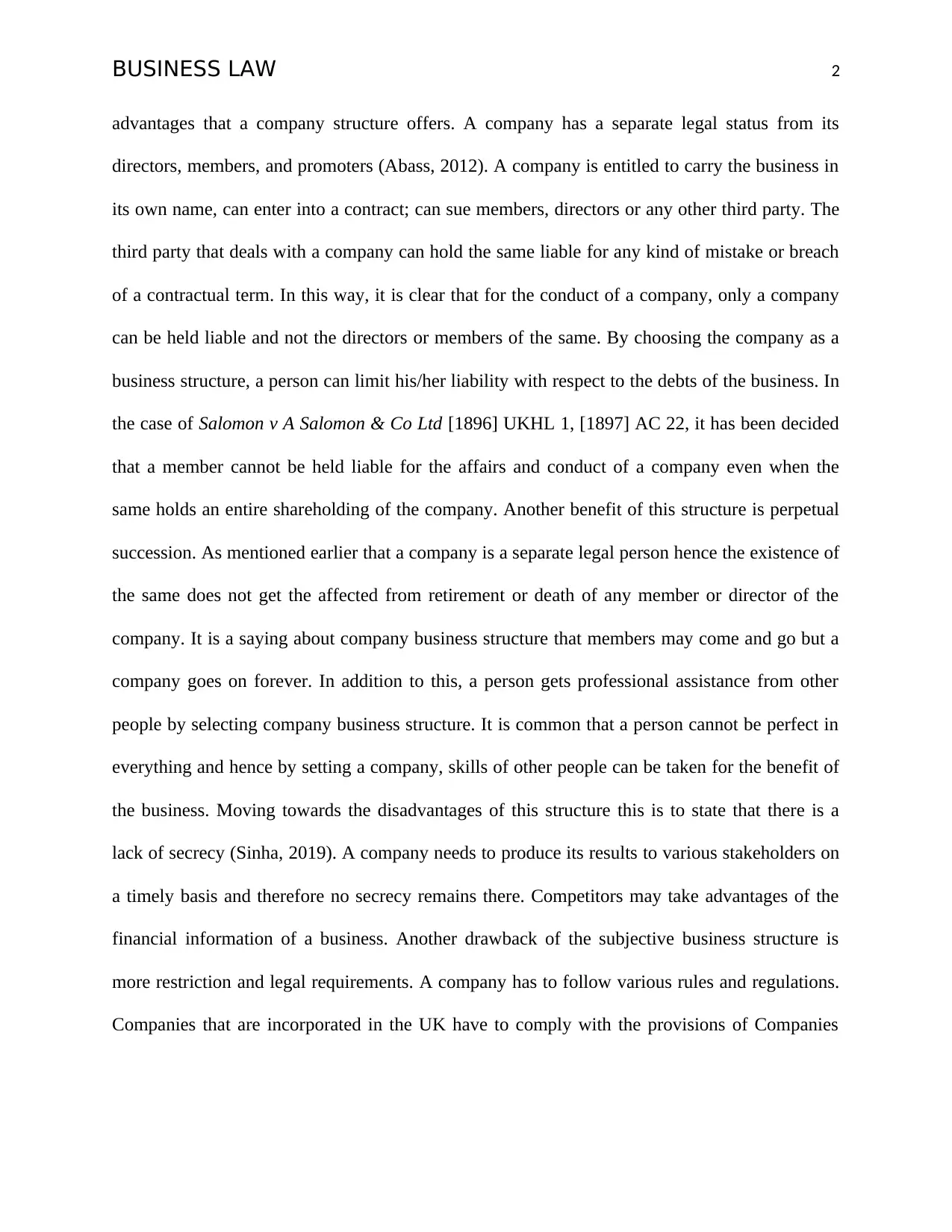
BUSINESS LAW 2
advantages that a company structure offers. A company has a separate legal status from its
directors, members, and promoters (Abass, 2012). A company is entitled to carry the business in
its own name, can enter into a contract; can sue members, directors or any other third party. The
third party that deals with a company can hold the same liable for any kind of mistake or breach
of a contractual term. In this way, it is clear that for the conduct of a company, only a company
can be held liable and not the directors or members of the same. By choosing the company as a
business structure, a person can limit his/her liability with respect to the debts of the business. In
the case of Salomon v A Salomon & Co Ltd [1896] UKHL 1, [1897] AC 22, it has been decided
that a member cannot be held liable for the affairs and conduct of a company even when the
same holds an entire shareholding of the company. Another benefit of this structure is perpetual
succession. As mentioned earlier that a company is a separate legal person hence the existence of
the same does not get the affected from retirement or death of any member or director of the
company. It is a saying about company business structure that members may come and go but a
company goes on forever. In addition to this, a person gets professional assistance from other
people by selecting company business structure. It is common that a person cannot be perfect in
everything and hence by setting a company, skills of other people can be taken for the benefit of
the business. Moving towards the disadvantages of this structure this is to state that there is a
lack of secrecy (Sinha, 2019). A company needs to produce its results to various stakeholders on
a timely basis and therefore no secrecy remains there. Competitors may take advantages of the
financial information of a business. Another drawback of the subjective business structure is
more restriction and legal requirements. A company has to follow various rules and regulations.
Companies that are incorporated in the UK have to comply with the provisions of Companies
advantages that a company structure offers. A company has a separate legal status from its
directors, members, and promoters (Abass, 2012). A company is entitled to carry the business in
its own name, can enter into a contract; can sue members, directors or any other third party. The
third party that deals with a company can hold the same liable for any kind of mistake or breach
of a contractual term. In this way, it is clear that for the conduct of a company, only a company
can be held liable and not the directors or members of the same. By choosing the company as a
business structure, a person can limit his/her liability with respect to the debts of the business. In
the case of Salomon v A Salomon & Co Ltd [1896] UKHL 1, [1897] AC 22, it has been decided
that a member cannot be held liable for the affairs and conduct of a company even when the
same holds an entire shareholding of the company. Another benefit of this structure is perpetual
succession. As mentioned earlier that a company is a separate legal person hence the existence of
the same does not get the affected from retirement or death of any member or director of the
company. It is a saying about company business structure that members may come and go but a
company goes on forever. In addition to this, a person gets professional assistance from other
people by selecting company business structure. It is common that a person cannot be perfect in
everything and hence by setting a company, skills of other people can be taken for the benefit of
the business. Moving towards the disadvantages of this structure this is to state that there is a
lack of secrecy (Sinha, 2019). A company needs to produce its results to various stakeholders on
a timely basis and therefore no secrecy remains there. Competitors may take advantages of the
financial information of a business. Another drawback of the subjective business structure is
more restriction and legal requirements. A company has to follow various rules and regulations.
Companies that are incorporated in the UK have to comply with the provisions of Companies
⊘ This is a preview!⊘
Do you want full access?
Subscribe today to unlock all pages.

Trusted by 1+ million students worldwide
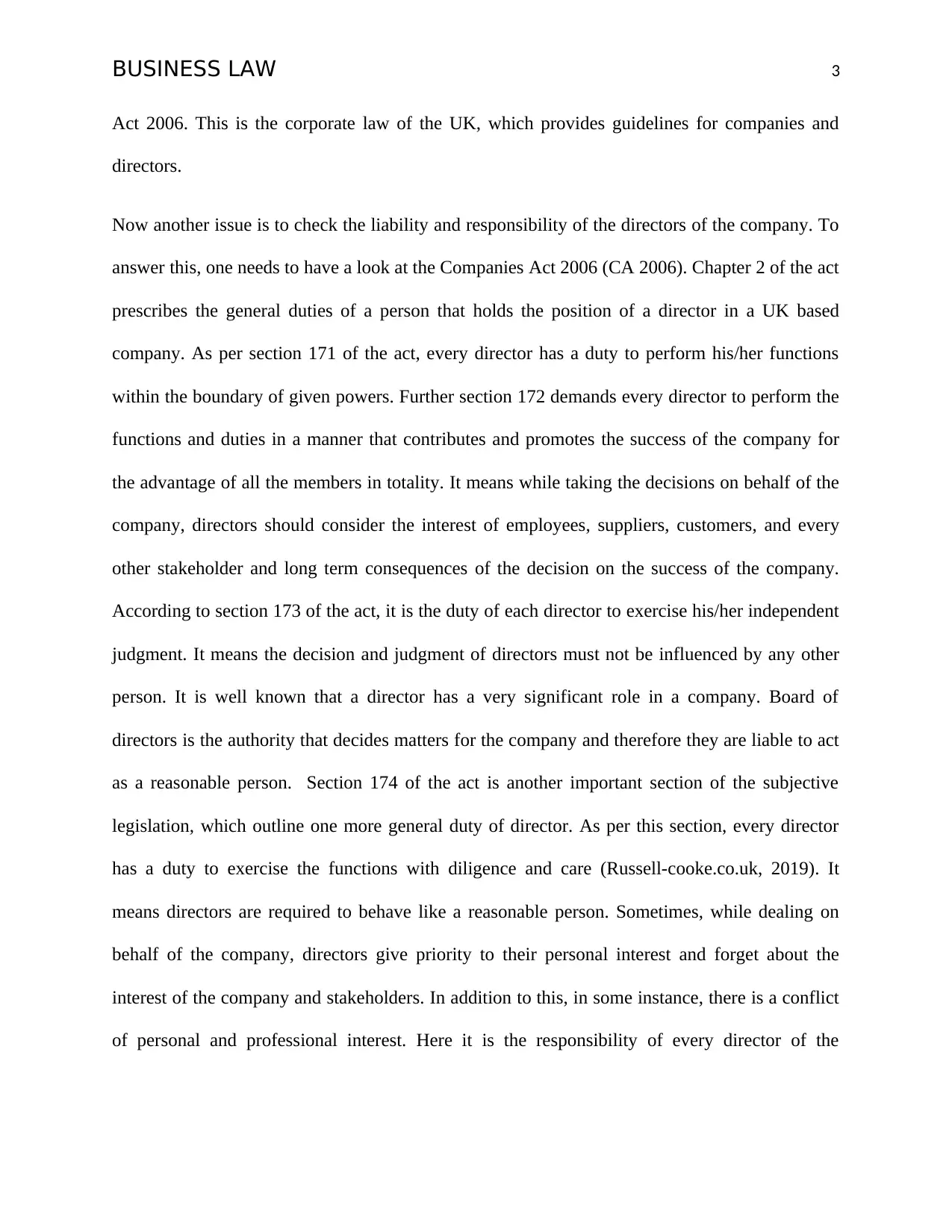
BUSINESS LAW 3
Act 2006. This is the corporate law of the UK, which provides guidelines for companies and
directors.
Now another issue is to check the liability and responsibility of the directors of the company. To
answer this, one needs to have a look at the Companies Act 2006 (CA 2006). Chapter 2 of the act
prescribes the general duties of a person that holds the position of a director in a UK based
company. As per section 171 of the act, every director has a duty to perform his/her functions
within the boundary of given powers. Further section 172 demands every director to perform the
functions and duties in a manner that contributes and promotes the success of the company for
the advantage of all the members in totality. It means while taking the decisions on behalf of the
company, directors should consider the interest of employees, suppliers, customers, and every
other stakeholder and long term consequences of the decision on the success of the company.
According to section 173 of the act, it is the duty of each director to exercise his/her independent
judgment. It means the decision and judgment of directors must not be influenced by any other
person. It is well known that a director has a very significant role in a company. Board of
directors is the authority that decides matters for the company and therefore they are liable to act
as a reasonable person. Section 174 of the act is another important section of the subjective
legislation, which outline one more general duty of director. As per this section, every director
has a duty to exercise the functions with diligence and care (Russell-cooke.co.uk, 2019). It
means directors are required to behave like a reasonable person. Sometimes, while dealing on
behalf of the company, directors give priority to their personal interest and forget about the
interest of the company and stakeholders. In addition to this, in some instance, there is a conflict
of personal and professional interest. Here it is the responsibility of every director of the
Act 2006. This is the corporate law of the UK, which provides guidelines for companies and
directors.
Now another issue is to check the liability and responsibility of the directors of the company. To
answer this, one needs to have a look at the Companies Act 2006 (CA 2006). Chapter 2 of the act
prescribes the general duties of a person that holds the position of a director in a UK based
company. As per section 171 of the act, every director has a duty to perform his/her functions
within the boundary of given powers. Further section 172 demands every director to perform the
functions and duties in a manner that contributes and promotes the success of the company for
the advantage of all the members in totality. It means while taking the decisions on behalf of the
company, directors should consider the interest of employees, suppliers, customers, and every
other stakeholder and long term consequences of the decision on the success of the company.
According to section 173 of the act, it is the duty of each director to exercise his/her independent
judgment. It means the decision and judgment of directors must not be influenced by any other
person. It is well known that a director has a very significant role in a company. Board of
directors is the authority that decides matters for the company and therefore they are liable to act
as a reasonable person. Section 174 of the act is another important section of the subjective
legislation, which outline one more general duty of director. As per this section, every director
has a duty to exercise the functions with diligence and care (Russell-cooke.co.uk, 2019). It
means directors are required to behave like a reasonable person. Sometimes, while dealing on
behalf of the company, directors give priority to their personal interest and forget about the
interest of the company and stakeholders. In addition to this, in some instance, there is a conflict
of personal and professional interest. Here it is the responsibility of every director of the
Paraphrase This Document
Need a fresh take? Get an instant paraphrase of this document with our AI Paraphraser
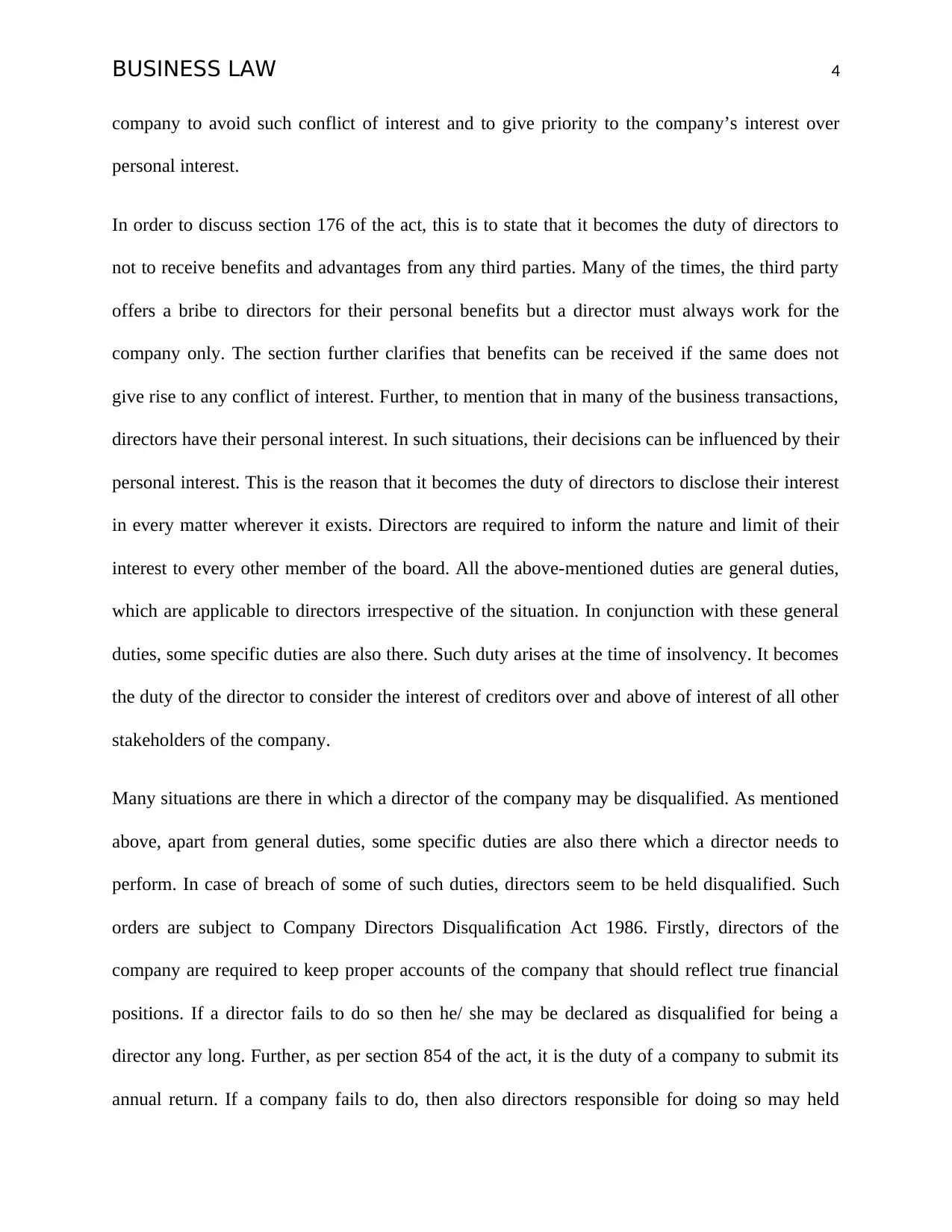
BUSINESS LAW 4
company to avoid such conflict of interest and to give priority to the company’s interest over
personal interest.
In order to discuss section 176 of the act, this is to state that it becomes the duty of directors to
not to receive benefits and advantages from any third parties. Many of the times, the third party
offers a bribe to directors for their personal benefits but a director must always work for the
company only. The section further clarifies that benefits can be received if the same does not
give rise to any conflict of interest. Further, to mention that in many of the business transactions,
directors have their personal interest. In such situations, their decisions can be influenced by their
personal interest. This is the reason that it becomes the duty of directors to disclose their interest
in every matter wherever it exists. Directors are required to inform the nature and limit of their
interest to every other member of the board. All the above-mentioned duties are general duties,
which are applicable to directors irrespective of the situation. In conjunction with these general
duties, some specific duties are also there. Such duty arises at the time of insolvency. It becomes
the duty of the director to consider the interest of creditors over and above of interest of all other
stakeholders of the company.
Many situations are there in which a director of the company may be disqualified. As mentioned
above, apart from general duties, some specific duties are also there which a director needs to
perform. In case of breach of some of such duties, directors seem to be held disqualified. Such
orders are subject to Company Directors Disqualification Act 1986. Firstly, directors of the
company are required to keep proper accounts of the company that should reflect true financial
positions. If a director fails to do so then he/ she may be declared as disqualified for being a
director any long. Further, as per section 854 of the act, it is the duty of a company to submit its
annual return. If a company fails to do, then also directors responsible for doing so may held
company to avoid such conflict of interest and to give priority to the company’s interest over
personal interest.
In order to discuss section 176 of the act, this is to state that it becomes the duty of directors to
not to receive benefits and advantages from any third parties. Many of the times, the third party
offers a bribe to directors for their personal benefits but a director must always work for the
company only. The section further clarifies that benefits can be received if the same does not
give rise to any conflict of interest. Further, to mention that in many of the business transactions,
directors have their personal interest. In such situations, their decisions can be influenced by their
personal interest. This is the reason that it becomes the duty of directors to disclose their interest
in every matter wherever it exists. Directors are required to inform the nature and limit of their
interest to every other member of the board. All the above-mentioned duties are general duties,
which are applicable to directors irrespective of the situation. In conjunction with these general
duties, some specific duties are also there. Such duty arises at the time of insolvency. It becomes
the duty of the director to consider the interest of creditors over and above of interest of all other
stakeholders of the company.
Many situations are there in which a director of the company may be disqualified. As mentioned
above, apart from general duties, some specific duties are also there which a director needs to
perform. In case of breach of some of such duties, directors seem to be held disqualified. Such
orders are subject to Company Directors Disqualification Act 1986. Firstly, directors of the
company are required to keep proper accounts of the company that should reflect true financial
positions. If a director fails to do so then he/ she may be declared as disqualified for being a
director any long. Further, as per section 854 of the act, it is the duty of a company to submit its
annual return. If a company fails to do, then also directors responsible for doing so may held
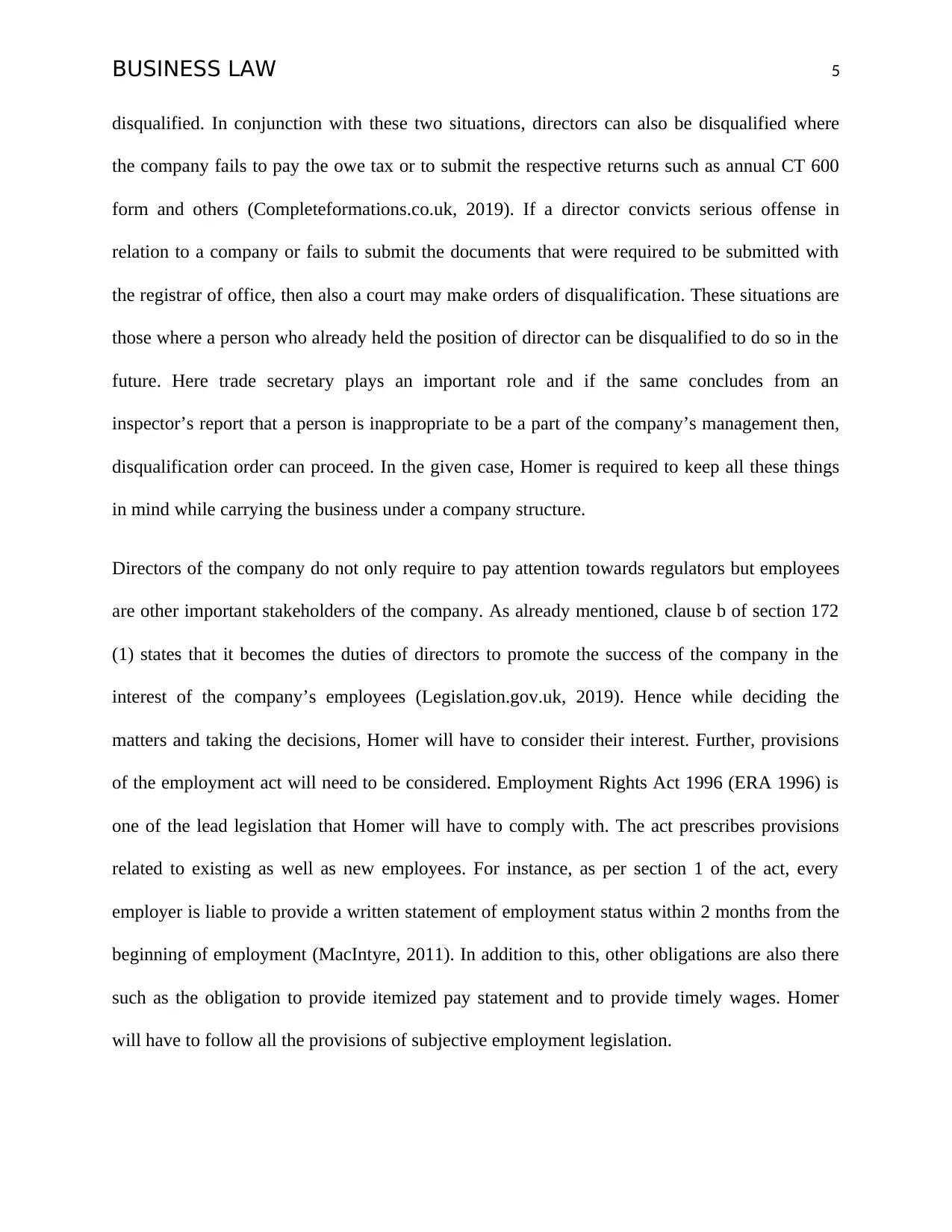
BUSINESS LAW 5
disqualified. In conjunction with these two situations, directors can also be disqualified where
the company fails to pay the owe tax or to submit the respective returns such as annual CT 600
form and others (Completeformations.co.uk, 2019). If a director convicts serious offense in
relation to a company or fails to submit the documents that were required to be submitted with
the registrar of office, then also a court may make orders of disqualification. These situations are
those where a person who already held the position of director can be disqualified to do so in the
future. Here trade secretary plays an important role and if the same concludes from an
inspector’s report that a person is inappropriate to be a part of the company’s management then,
disqualification order can proceed. In the given case, Homer is required to keep all these things
in mind while carrying the business under a company structure.
Directors of the company do not only require to pay attention towards regulators but employees
are other important stakeholders of the company. As already mentioned, clause b of section 172
(1) states that it becomes the duties of directors to promote the success of the company in the
interest of the company’s employees (Legislation.gov.uk, 2019). Hence while deciding the
matters and taking the decisions, Homer will have to consider their interest. Further, provisions
of the employment act will need to be considered. Employment Rights Act 1996 (ERA 1996) is
one of the lead legislation that Homer will have to comply with. The act prescribes provisions
related to existing as well as new employees. For instance, as per section 1 of the act, every
employer is liable to provide a written statement of employment status within 2 months from the
beginning of employment (MacIntyre, 2011). In addition to this, other obligations are also there
such as the obligation to provide itemized pay statement and to provide timely wages. Homer
will have to follow all the provisions of subjective employment legislation.
disqualified. In conjunction with these two situations, directors can also be disqualified where
the company fails to pay the owe tax or to submit the respective returns such as annual CT 600
form and others (Completeformations.co.uk, 2019). If a director convicts serious offense in
relation to a company or fails to submit the documents that were required to be submitted with
the registrar of office, then also a court may make orders of disqualification. These situations are
those where a person who already held the position of director can be disqualified to do so in the
future. Here trade secretary plays an important role and if the same concludes from an
inspector’s report that a person is inappropriate to be a part of the company’s management then,
disqualification order can proceed. In the given case, Homer is required to keep all these things
in mind while carrying the business under a company structure.
Directors of the company do not only require to pay attention towards regulators but employees
are other important stakeholders of the company. As already mentioned, clause b of section 172
(1) states that it becomes the duties of directors to promote the success of the company in the
interest of the company’s employees (Legislation.gov.uk, 2019). Hence while deciding the
matters and taking the decisions, Homer will have to consider their interest. Further, provisions
of the employment act will need to be considered. Employment Rights Act 1996 (ERA 1996) is
one of the lead legislation that Homer will have to comply with. The act prescribes provisions
related to existing as well as new employees. For instance, as per section 1 of the act, every
employer is liable to provide a written statement of employment status within 2 months from the
beginning of employment (MacIntyre, 2011). In addition to this, other obligations are also there
such as the obligation to provide itemized pay statement and to provide timely wages. Homer
will have to follow all the provisions of subjective employment legislation.
⊘ This is a preview!⊘
Do you want full access?
Subscribe today to unlock all pages.

Trusted by 1+ million students worldwide
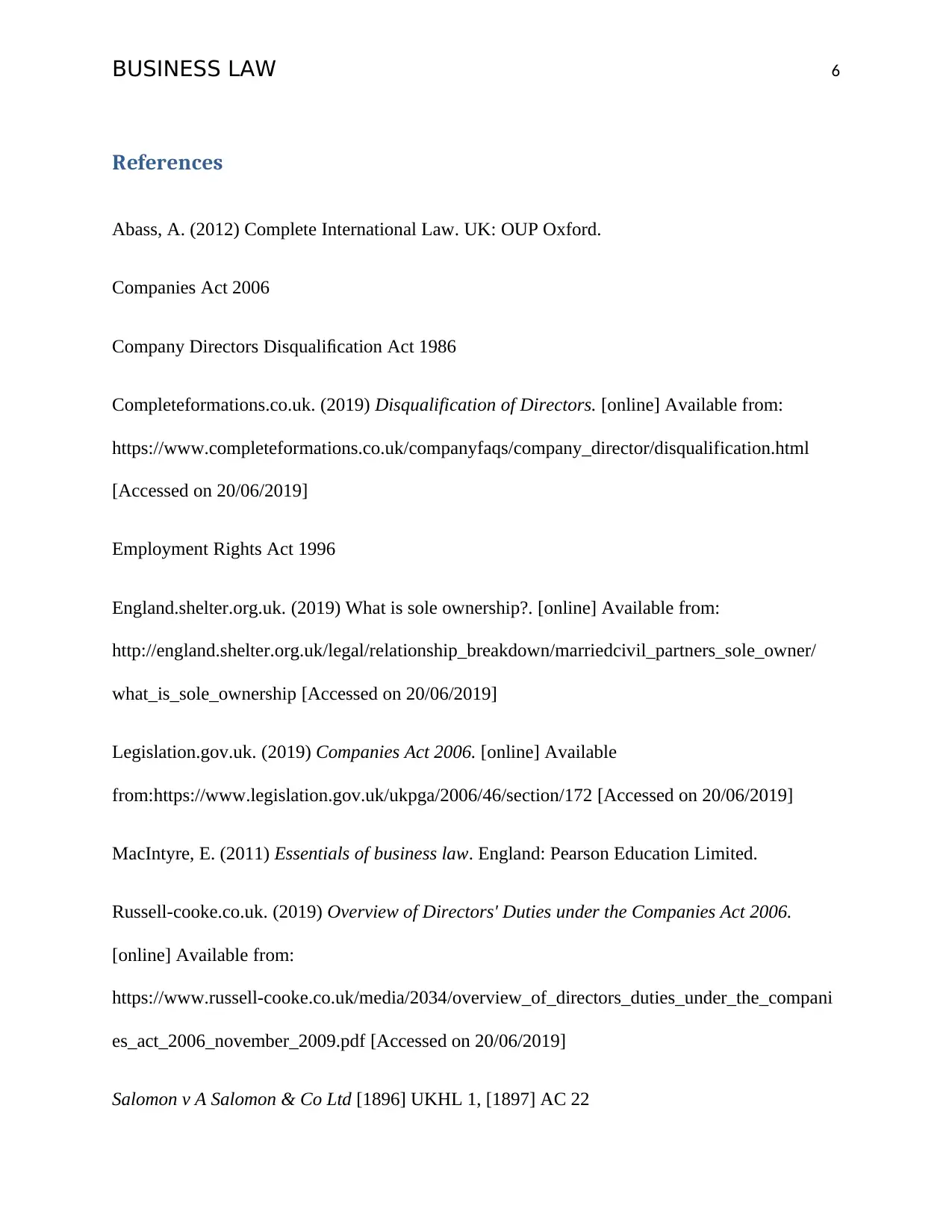
BUSINESS LAW 6
References
Abass, A. (2012) Complete International Law. UK: OUP Oxford.
Companies Act 2006
Company Directors Disqualification Act 1986
Completeformations.co.uk. (2019) Disqualification of Directors. [online] Available from:
https://www.completeformations.co.uk/companyfaqs/company_director/disqualification.html
[Accessed on 20/06/2019]
Employment Rights Act 1996
England.shelter.org.uk. (2019) What is sole ownership?. [online] Available from:
http://england.shelter.org.uk/legal/relationship_breakdown/marriedcivil_partners_sole_owner/
what_is_sole_ownership [Accessed on 20/06/2019]
Legislation.gov.uk. (2019) Companies Act 2006. [online] Available
from:https://www.legislation.gov.uk/ukpga/2006/46/section/172 [Accessed on 20/06/2019]
MacIntyre, E. (2011) Essentials of business law. England: Pearson Education Limited.
Russell-cooke.co.uk. (2019) Overview of Directors' Duties under the Companies Act 2006.
[online] Available from:
https://www.russell-cooke.co.uk/media/2034/overview_of_directors_duties_under_the_compani
es_act_2006_november_2009.pdf [Accessed on 20/06/2019]
Salomon v A Salomon & Co Ltd [1896] UKHL 1, [1897] AC 22
References
Abass, A. (2012) Complete International Law. UK: OUP Oxford.
Companies Act 2006
Company Directors Disqualification Act 1986
Completeformations.co.uk. (2019) Disqualification of Directors. [online] Available from:
https://www.completeformations.co.uk/companyfaqs/company_director/disqualification.html
[Accessed on 20/06/2019]
Employment Rights Act 1996
England.shelter.org.uk. (2019) What is sole ownership?. [online] Available from:
http://england.shelter.org.uk/legal/relationship_breakdown/marriedcivil_partners_sole_owner/
what_is_sole_ownership [Accessed on 20/06/2019]
Legislation.gov.uk. (2019) Companies Act 2006. [online] Available
from:https://www.legislation.gov.uk/ukpga/2006/46/section/172 [Accessed on 20/06/2019]
MacIntyre, E. (2011) Essentials of business law. England: Pearson Education Limited.
Russell-cooke.co.uk. (2019) Overview of Directors' Duties under the Companies Act 2006.
[online] Available from:
https://www.russell-cooke.co.uk/media/2034/overview_of_directors_duties_under_the_compani
es_act_2006_november_2009.pdf [Accessed on 20/06/2019]
Salomon v A Salomon & Co Ltd [1896] UKHL 1, [1897] AC 22
Paraphrase This Document
Need a fresh take? Get an instant paraphrase of this document with our AI Paraphraser
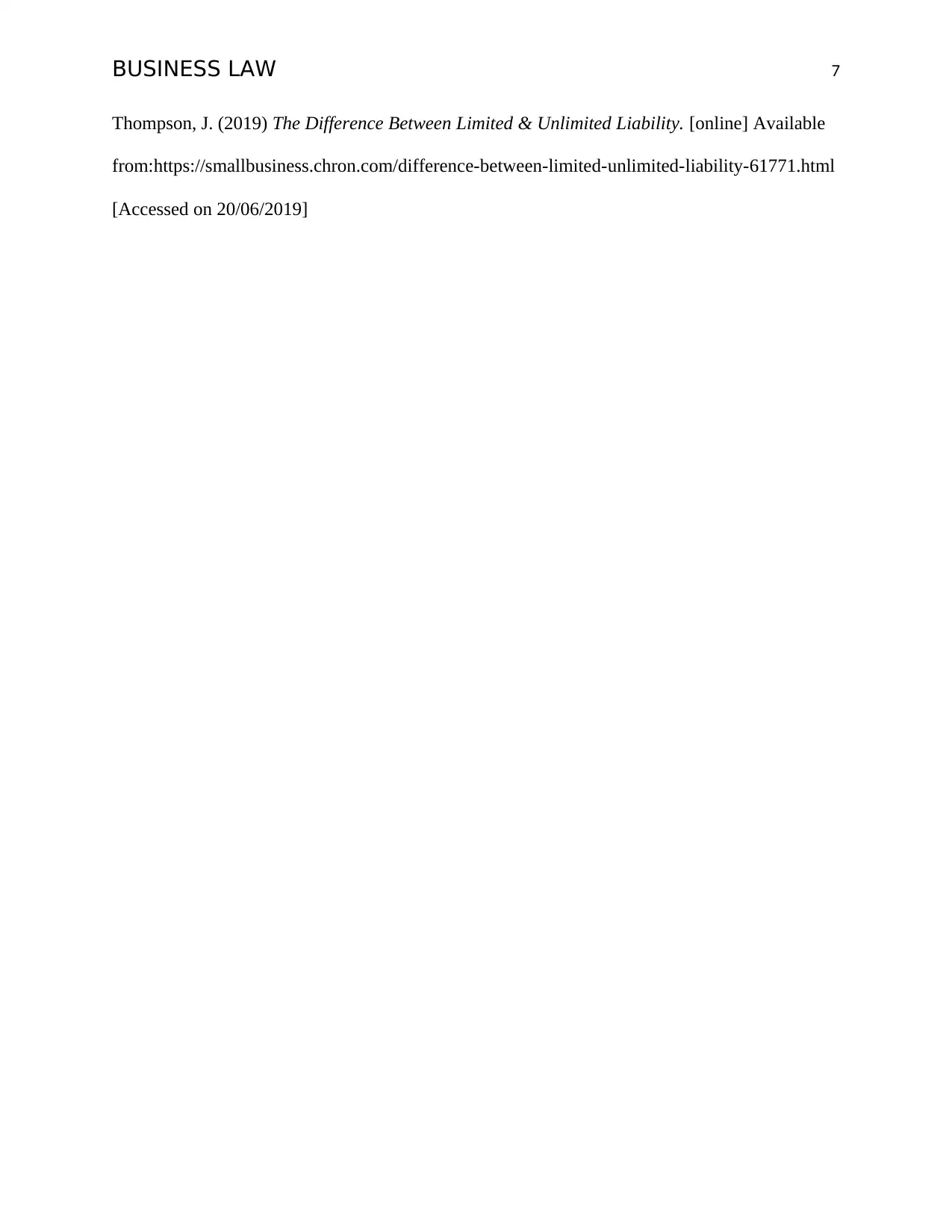
BUSINESS LAW 7
Thompson, J. (2019) The Difference Between Limited & Unlimited Liability. [online] Available
from:https://smallbusiness.chron.com/difference-between-limited-unlimited-liability-61771.html
[Accessed on 20/06/2019]
Thompson, J. (2019) The Difference Between Limited & Unlimited Liability. [online] Available
from:https://smallbusiness.chron.com/difference-between-limited-unlimited-liability-61771.html
[Accessed on 20/06/2019]
1 out of 8
Related Documents
Your All-in-One AI-Powered Toolkit for Academic Success.
+13062052269
info@desklib.com
Available 24*7 on WhatsApp / Email
![[object Object]](/_next/static/media/star-bottom.7253800d.svg)
Unlock your academic potential
Copyright © 2020–2026 A2Z Services. All Rights Reserved. Developed and managed by ZUCOL.





